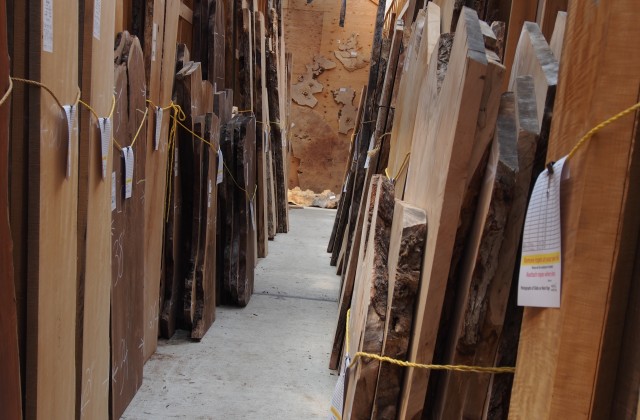Out and About
Not your Average Run Of the Mill
By Rosanna Trestman
Every piece of lumber begins as a log.
Typically, the log goes from forest to sawmill, and comes out a plank cut to a uniform width, length and height.
But at Berkshire Products, a sawmill tucked on Ashley Falls Road in Sheffield, Mass., the log’s organic form is not stripped away, but celebrated. “We do things a little differently,” says General Manager Dannielle Forget, as she gives us a tour of the mill.
First the log is fed to the Woodmizer 1000, which stands dramatically out in the open. Called the “Mill for Massive Logs,” this daunting bandsaw can cut lumber up to 70 inches wide and 20 feet long in less than 40 seconds.
Forget noticed that I gave the behemoth a wide berth. “Safety is a huge priority for us,” she assured me. “The guys are well-trained in protocols before they can work, then they graduate through the tools. We hold regular team safety meetings. Knock on lumber, we haven’t had any issues.”
Berkshire Products was started in 1987 by Alan Zablonski, a former woodworking teacher at Mt Everet Academy in Egremont, Mass. In his job he was limited to shop lumber, when what he longed to work with was figured wood, the kind with natural edges, deformities—in short, character. “I always wanted to be a sculptor,” he said. “I liked fooling around with natural objects like stones, branches, stuff like that. But you have to pay the bills first.” So he opened his own sawmill for wood as close to sculpture as you can get.
The lot holds a collection of barns and buildings, each specific to a step in the log’s production. After being cut the wood is air-dried for two to three years or seasoned in a solar or vacuum kiln, then sanded to 120 grit. “Then it is photographed for the website,” says Forget.
Continuing the tour, Forget takes us into Building 3, the centerpiece of the sawmill. Walking through through the aisle is like being in a two-dimensional forest. Slab after slab of wood stands on either side of the aisle, from floor to ceiling. Customers can effortlessly leaf through the vertically displayed racks of wood—over 1000 of them.
Berkshire Products carries around 40 species of wood at any given time. It has one of the largest selections of unique lumber in the country. Specialized woodworkers come for the hard-to-find logs, like African Bubinga and Jatoba from Bolivia, but the primary market is for native species like Eastern pine, redwood, and Clara walnut from California.
Forget sprays a plank with denatured alcohol, a technique that brings out the color and figure, showing what the wood would look like with a clear coat. Beautiful.
“Some people are looking for a more uniform piece,” Forget says as she pulls out a gorgeous slab of bigleaf maple that would make a stunning desktop. “But others go straight for the burls. It’s the deformities that makes the wood so desirable,” she notes, “the bigger, the uglier, the better. Ironically, burls are actually a cancer of the tree.” The gnarly slabs and stumps are used in everything from decorative bowls to 15,000-pound table tops.
I am curious about just where these huge slabs, some the diameter of redwoods, come from. This is a common question, and Forget is quick to assure me that while they are old growth, no trees were felled for their wood. Zablonski goes on buying trips, mostly in the western U.S., where he selects high quality logs from salvage yards—reclaimed wood on a large scale. The exotics, on the other hand, are imported from all over the world, where they were sustainably harvested.
So, the wood finds its way to the Berkshires, but how do people find it? “Google is our best friend,” says Forget. The company website inventories hundreds of in-stock woods. In each picture a man stands next to the slab for scale. Locally, designers and artisans are their biggest customer base.
Our tour concludes in Building 4, the Customer Idea Room. This small gallery showcases wood used in different applications, mostly table tops. When I ask why the designs are so simple, Danielle explains that they illustrate what a specific wood looks like in its fully-finished state. They are priced astronomically to discourage retail sales. “We don’t want to compete with our customers, who buy this wood to design things for their own customers,” she says.
Berkshire Products is open all day from Monday to Friday and Saturdays until noon. Visitors are welcome without an appointment.
Photo by Dov Trestman.

